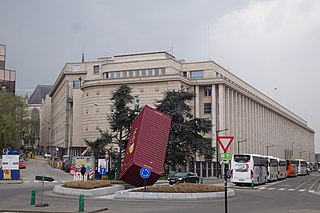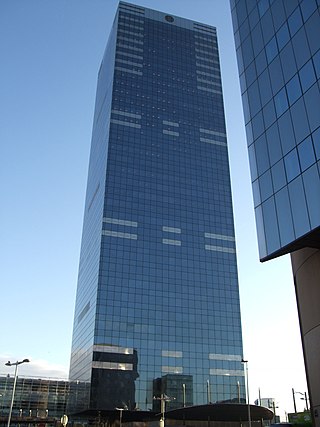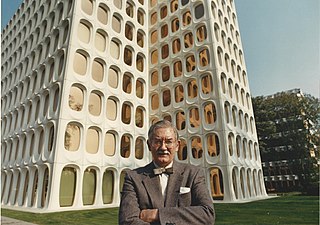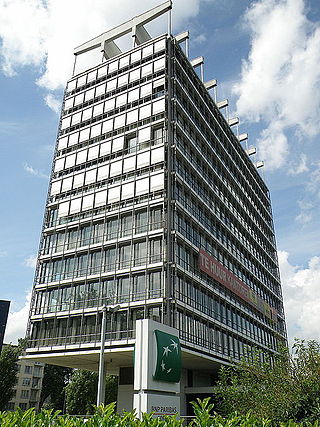
Brussels, officially the Brussels-Capital Region, is a region of Belgium comprising 19 municipalities, including the City of Brussels, which is the capital of Belgium. The Brussels-Capital Region is located in the central portion of the country and is a part of both the French Community of Belgium and the Flemish Community, but is separate from the Flemish Region and the Walloon Region, located less than 4 kilometres (2.5 mi) to the south. Historically Dutch-speaking, Brussels saw a language shift to French from the late 19th century. Nowadays, the Brussels-Capital Region is officially bilingual in French and Dutch, although French is the majority language and lingua franca. Brussels is also increasingly becoming multilingual. English is spoken widely and many migrants and expatriates speak other languages as well.

The National Basilica of the Sacred Heart is a Roman Catholic minor basilica and parish church in Brussels, Belgium. It is dedicated to the Sacred Heart, inspired by the Basilique du Sacré-Coeur in Paris. Symbolically, King Leopold II laid the first stone in 1905 during the celebrations of the 75th anniversary of Belgian independence. The construction was halted by the two World Wars and finished only in 1970. Belonging to the Metropolitan Archdiocese of Mechelen–Brussels, it is one of the largest churches by area in the world.

The National Bank of Belgium is the Belgian member of the Eurosystem. It was established by a law of 5 May 1850 and has been the monetary authority for Belgium from then until 1998, issuing the Belgian franc.

The South Tower is a 38-storey, 148 metres (486 ft) skyscraper constructed between 1962 and 1967 in Brussels, Belgium. The tower is the tallest building in Belgium, and was the tallest in the European Economic Community (EEC) when it was built, until it was surpassed by Tour Montparnasse in Paris in 1972.

The Royal Museum for Central Africa (RMCA), communicating under the name AfricaMuseum since 2018, is an ethnography and natural history museum situated in Tervuren in Flemish Brabant, Belgium, just outside Brussels. It was originally built to showcase King Leopold II's Congo Free State in the International Exposition of 1897.

Watermael-Boitsfort or Watermaal-Bosvoorde, often simply called Boitsfort in French or Bosvoorde in Dutch, is one of the 19 municipalities of the Brussels-Capital Region, Belgium. Located in the south-eastern part of the region, it is bordered by Auderghem, the City of Brussels, Ixelles, and Uccle, as well as the Flemish municipalities of Hoeilaart, Overijse and Sint-Genesius-Rode. In common with all of Brussels' municipalities, it is legally bilingual (French–Dutch).

The Palace of Justice of Brussels or Law Courts of Brussels is a courthouse in Brussels, Belgium. It is the country's most important court building, seat of the judicial arrondissement of Brussels, as well as of several courts and tribunals, including the Court of Cassation, the Court of Assizes, the Court of Appeal of Brussels, the Tribunal of First Instance of Brussels, and the Bar Association of Brussels.

The Place Royale or Koningsplein is a historic neoclassical square in the Royal Quarter of Brussels, Belgium. Modelled after the so-called French royal square and built between 1775 and 1782, according to a plan of the architects Jean-Benoît-Vincent Barré and Gilles-Barnabé Guimard, to replace the former Palace of Coudenberg, it was part of an urban project including Brussels Park.
Axa Bank Belgium, located in Antwerp Belgium, is Axa Group’s banking arm providing retail banking to individuals, and small companies locally. The bank also cooperates with Axa’s local insurance company.

The following is a timeline of the history of Brussels, Belgium.

The Cirque Royal (French) or Koninklijk Circus (Dutch), meaning "Royal Circus", is an entertainment venue in Brussels, Belgium. Conceived by the architect Wilhelm Kuhnen in 1953, the building has a circular appearance, but in fact is constructed as a regular polygon. It can hold 2,000 spectators, and nowadays is primarily used for live music shows.

The Church of St. John the Baptist is a Roman Catholic parish church located in the centre of Molenbeek-Saint-Jean, a municipality of Brussels, Belgium. It is dedicated to Saint John the Baptist, the patron saint of Molenbeek.
Events in the year 1895 in Belgium.
Events in the year 1847 in Belgium.
The following lists events that happened during 1878 in the Kingdom of Belgium.

The CBR Building is a functionalist office building situated in Watermael-Boitsfort, a municipality of Brussels, Belgium. Designed by the architects Constantin Brodzki and Marcel Lambrichs and built between 1967 and 1970, its prefabricated modular facade showcases white concrete instead of hiding it as a construction material, classifying the building as a New Brutalist piece of architecture. In November 2018, it was added to the list of protected heritage within the Brussels-Capital Region.

Constantin Brodzki was an Italian-born, Belgian architect. He is mostly known for his Brutalist architecture and prefabricated modules using concrete in fluid and organic shapes. He was awarded the quinquennial Baron Horta Prize in 2007.

KANAL - Centre Pompidou is a museum for modern and contemporary art located in Brussels, Belgium, near the Brussels–Charleroi Canal, in the former buildings of a Citroën garage. The definitive opening is scheduled for 2025. During the renovations, the museum remains open at its temporary location K1, at 1, avenue du Port/Havenlaan.

The Poelaert Elevators, in popular language Elevators of the Marolles is a public elevator in the Marolles/Marollen district of Brussels, Belgium. It connects the lower and upper town at the Square Breughel l'Ancien/Breughel de Oudeplein with the Place Poelaert/Poelaertplein, in the vicinity of the Palace of Justice. The elevator consists of two independent elevators, hence the plural elevators sometimes used for its name.

The BP Building, previously also known as the Axa-Royale Belge Tower, is a suspended-structure office building in Antwerp, Belgium, designed by the Belgian architect Léon Stynen. The building was completed in 1963 and features a unique cantilevered floor structure and cable supports. All of the floors are supported with external cables that are attached to roof beams: the weight of roof beams, all floors, and the external walls are carried by a center core. The building was commissioned by BP and is still referred to as the "BP Building", but is now owned by Buysse & Partners Smart Assets since 2018. Its architecture has been classified as Modernist and Brutalist.


















